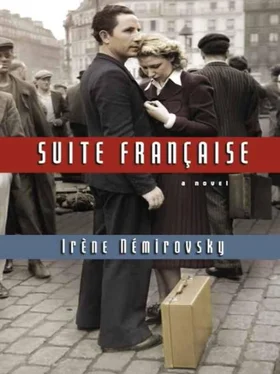For the first months of the war, Irène and Michel stayed in Paris, making frequent journeys to visit their children. Then, in June 1940, the Germans occupied Paris and the Némirovskys decided to leave Paris altogether, taking up residence in a hotel opposite the house of Cécile Michaud, the Hôtel des Voyageurs. From then on life became increasingly difficult. On 3 October 1940, a law was passed giving Jews inferior legal and social standing. Most important, it defined, based on racial criteria, who was to be considered Jewish in the French State. The Némirovskys, who took part in an enforced census in June 1941, were both Jewish and foreign: their baptism certificates were useless. Michel no longer had the right to work at the bank; the publishing houses were "Aryanising" their personnel and authors, so Irène could no longer be published. Further race laws passed in October 1940 and June 1941 stipulated that Jews could be placed under house arrest or deported and interned in concentration camps. Issy-l'Evêque was now in the occupied zone and the Hôtel des Voyageurs was full of German soldiers. Irène, her husband and her daughters all openly wore the Jewish star.
Irène Némirovsky watched what was happening with pitiless clarity: she had no doubt that these events would result in tragedy. But life went on. Denise celebrated her first Communion, despite going to the local school with the Jewish star sewn prominently on to the front of her coat. Michel amused himself by writing a multiplication table for Denise in rhyme. The family were finally able to find a large house to rent. Irène read and wrote constantly. Every day, after breakfast, she would go out, sometimes walking for ten kilometres before finding a spot she liked. Then she would start working. Between 1940 and 1942, the publishing house Albin Michel and the director of the anti-Semitic newspaper Gringoire agreed to help her publish her short stories under various pseudonyms. She also wrote a life of Chekhov and a novel, Les Feux de l'automne, which would not be published until 1957. But, most important, in 1941 she started work on an ambitious novel to be called Suite Française.
Némirovsky began Suite Française, as was her habit, by writing notes on the work in progress and thoughts inspired by the situation in France. She created a list of characters, both major and minor, then checked that she had used them correctly. She dreamed of a book of a thousand pages, constructed like a symphony, but in five sections, according to rhythm and tone. She took Beethoven's Fifth Symphony as a model.
On 12 June 1942 she began to doubt she would be able to complete this huge endeavour. She had a premonition that she didn't have long to live. But she continued work on her book, simultaneously writing notes. She called these lucid, cynical remarks Notes sur l'état de France (Notes on the State of France). They prove that she had absolutely no illusions, not about the attitude of the inert French masses-"loathsome" in their defeat and collaboration-nor about her own fate. As she wrote at the top of the first page:
To lift such a heavy weight,
Sisyphus, you will need all your courage.
I do not lack the courage to complete the task
But the goal is far and time is short.
In her writing she denounced fear, cowardice, acceptance of humiliation, of persecution and massacre. She was alone. It was rare to find anyone in the literary and publishing worlds who did not choose to collaborate with the Nazis. Every day, Irène would go to meet the postman, but there were increasingly few letters from her publishers. She did not try to escape her fate by fleeing-to Switzerland for example, which was taking in a small number of Jews coming from France, especially women and children. She saw the situation in such bleak terms that on 3 June she wrote her Will and gave it to the children's governess, asking that she take care of Denise and Elisabeth if necessary. She gave precise instructions, listing all the possessions she had managed to save, which could be sold to provide money to pay the rent, heat the house, buy a stove, hire a gardener who would tend the vegetable garden to provide food while rationing lasted; she provided the addresses of her daughters' doctors, and details of their diet. Not a word of revolt. A straightforward understanding of the situation exactly as it was-hopeless.
On 3 July she wrote, "Just let it be over-one way or the other!" She saw the situation as a succession of violent shocks that could kill her.
On 11 July she was working in the pine forest, sitting on her blue cardigan "in the middle of an ocean of rotting leaves drenched by last night's storm, as if on a raft, my legs folded beneath me." That day she wrote a letter to her editor at Albin Michel that left no doubt about her certainty that she would not survive the war: "My dear friend… think of me sometimes. I have done a lot of writing. I suppose they will be posthumous works, but it helps pass the time."
On 13 July 1942, the French police knocked at the Némirovskys' door. They had come to arrest Irène. On 16 July, she was interned in the concentration camp at Pithiviers in the Loiret region. The next day she was deported to Auschwitz in Convoy number 6. She was registered at the extermination camp at Birkenau, and as she was very weak, was sent to the Revier. [2]She died on 17 August 1942.
When Irène was taken away, Michel did not understand that to be arrested and deported meant certain death. Every day he expected her to come home and insisted, at mealtimes, that her place be set at the table. In complete despair, he wrote to Marshal Pétain to explain that his wife had a delicate constitution and to request permission to take her place in the labour camp.
In October 1942, the Vichy government responded by arresting him. He was first imprisoned at Creusot, then Drancy, where his search document shows that 8,500 francs were taken from him. On 6 November 1942, he too was deported to Auschwitz and was sent straight to the gas chamber.
Immediately after arresting Michel Epstein, the police went to the village school to get Denise, but her schoolteacher hid her behind her bed. The police did not give up and continued their hunt. The Nemirovskys' governess had the presence of mind to remove the Jewish star from their clothes and flee the village with the little girls. They spent the rest of the war moving between hiding places. The first was a Catholic boarding school, where two of the nuns knew the little girls were Jewish. There Denise was given a false name but she never managed to get used to it, so she was often scolded in class because she didn't reply when she was called. But the French police-who it seems had little better to do than hunt down two children so they might share the same fate as their parents-picked up their trail. The girls were forced to leave the convent to hide out in a series of cellars in the region of Bordeaux. Whenever they boarded a train to move on, the governess would tell Denise to hide her nose. When Denise caught a chest infection, the people who were hiding her didn't help her to see a doctor.
The war over, the two girls returned to Paris and went to their grandmother's house to ask for help. Fanny had spent the war years in Nice, living in great comfort, but when the children rang the doorbell she refused to let them in, shouting through the closed door that if their parents were dead they should go to an orphanage. (Fanny died in 1972, in a large apartment in Paris on the avenue Président Wilson. The only things found in her safe were two books by her daughter: Jezebel and David Golder.) Each day, wearing a sign with their names written on it, Denise and Elisabeth would make their way to the platform of the Gare de l'Est, where trains carrying the survivors of the concentration camps were beginning to arrive. They would also go to the Hôtel Lutétia, which had been turned into a reception centre for returning deportees-once, Denise began to run down the street after a woman because she thought she recognised her mother-but eventually it became clear that their parents were not coming back.
Читать дальше

![Константин Бальмонт - Константин Бальмонт и поэзия французского языка/Konstantin Balmont et la poésie de langue française [билингва ru-fr]](/books/60875/konstantin-balmont-konstantin-balmont-i-poeziya-francuzskogo-yazyka-konstantin-balmont-et-thumb.webp)










